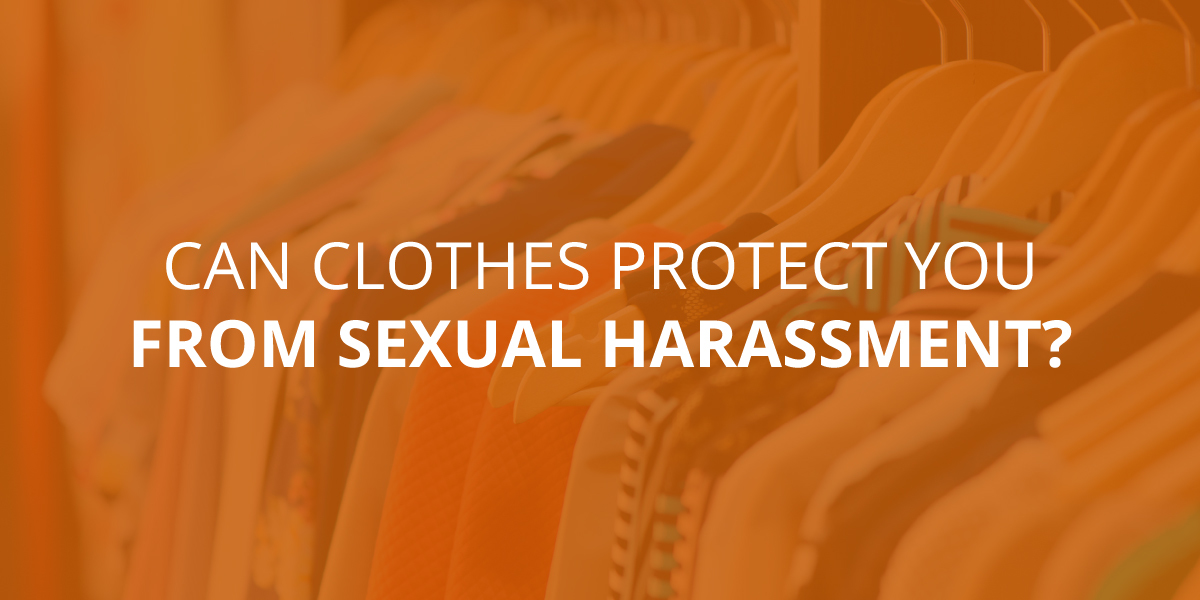
How many times have you heard this type of comment being directed at you or a female friend? Unfortunately, when conversations about sexual harassment or assault occur, the topic of the victim’s attire nearly always comes up. The concept that your clothing can invite or deter sexual harassment is widespread and persistent. For example:
- Nearly one-third of Britons who responded to a 2005 Amnesty International poll said that women were partly to blame for being assaulted when their behavior and attire were provocative.
- In 1999, Italy’s Supreme Court of Appeals ruled that it was impossible for a woman wearing jeans to be raped, as rapists couldn’t forcibly remove trousers.
On October 2017, Big Bang Theory actress Mayim Bialik wrote a controversial op-ed for the New York Times. A self-professed feminist, she suggested that modest clothing could protect women from sexual assault in many cases. Bialik conceded that in a perfect world, women should be able to dress and behave however they want.
“But our world isn’t perfect,” she warned. After stressing that nothing excuses men for sexually assaulting women, she added, “We can’t be naive about the culture we live in.”
Sufiya Ahmed, a writer for the Independent, took Bialik to task by pointing out the various instances of Muslim women who covered themselves in head to toe being groped and harassed in public. She insisted that sexual harassment and abuse had nothing to do with sexual desire. Rather, it was about power over the victim.
“A power that stems from male entitlement,” Ahmed wrote.
The idea that clothes can cause or prevent sexual harassment boils down to the core belief that if the victims looked or behaved differently, they wouldn’t have been attacked. It’s a myth that makes it easy to suggest that sexual assault only happens to people who bring it on themselves by making ‘bad’ choices.
A Federal Commission on Crime of Violence reported that most convicted rapists don’t even remember what their victims were wearing at the time of the attack. It also found that ‘provocative behavior’ on the part of the victim was an element in only 4.4% of reported rapes.
Nonetheless, many anti-rape campaigns on campuses, schools, and other public areas stress the idea that the only way you can be safe from sexual assault is to be careful what you wear and how you behave. There is an assumption that sexual predators are an inescapable part of life, and the onus is on you to avoid becoming an attractive target.
This Attitude Needs to Change
Real or presumed ‘immodesty’ should never be presented as a reason to justify sexual harassment and assault. No dress code gives anyone the right to touch you without your consent. Every assailant is responsible for their own actions and must be held fully accountable when that behavior goes outside the boundaries of what’s right or legal.
Can You Sue Your Assailant?
You can file a civil lawsuit against anyone who harasses or assaults you sexually. Potentially available damages include compensation for:
- Medical expenses
- Emotional distress
- Psychological counseling
- Time missed from work
North Carolina courts also allow you to seek punitive damages, which are awarded solely to punish the wrongdoer and deter others from engaging in similar behavior in the future.
In some instances, you may be able to sue third parties. If you are harassed or assaulted by an employee of a business, you could have a case against the employer. Similarly, if someone assaults you in a car park with non-working lights or lax security, you could file a lawsuit against the owner for failing to take reasonable steps to keep users of the facility safe.
Contact a North Carolina Sexual Harassment Attorney
The North Carolina sexual abuse lawyers at Copeley Law understand the guilt, shame, and embarrassment people feel after being harassed or assaulted, especially if their attire is being scrutinized or remarked on. We are committed to fighting for victims of sexual abuse and securing the compensation they need to process what happened and move forward. We are here for you, so to schedule a confidential consultation, contact Copeley Law PLLC or call (919) 627-1356.
